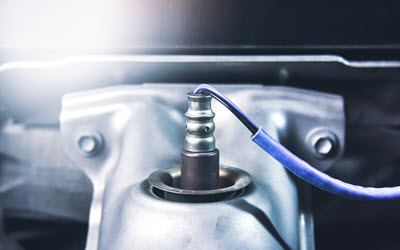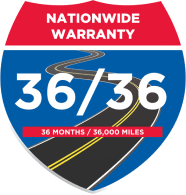
Volkswagens come equipped with an O2 sensor which simply measures the amount of oxygen in the exhaust. When too much or too little oxygen runs through the exhaust, the sensor sends signals to the ECM to adjust the air/fuel mix. This helps your Volkswagen run smoothly and reduce emissions.
When less oxygen is present in the car’s gasoline, more fuel will remain after combustion. This is called a rich mixture. However, when more oxygen is present in gasoline, it is referred to as a lean mixture.
A rich mixture prevents fuel from burning off properly, creating excess pollution emitted from your Volkswagen. While a lean air/fuel mixture creates nitrogen-oxide, which pollutes the atmosphere and leads to a decrease in overall vehicle performance and, subsequently, engine damage. This article will discuss the symptoms and the causes of a defective oxygen sensor.
The Volkswagen O2 Sensor
The oxygen sensor is the electronic measuring tool your engine’s computer uses to properly regulate the operation of your Volkswagen’s engine and keep it running smoothly and safely. It sends readings to the engine’s Electronic Computer Module (ECM) to adjust the air/fuel ratio in the engine.
The oxygen sensor measures the level of fuel and gases such as oxygen and nitrogen that leave the engine cylinders. The sensing element is a zirconium ceramic bulb coated on both sides with a thin coat of platinum. The bulb comes in contact with the hot exhaust gases, and the inside of the bulb is vented through the sensor body or wiring. Should the sensor detect too much fuel or gases, the ECU reduces the flow of fuel into the engine, and if the sensor detects too little fuel, the ECU increases the amount of fuel entering the engine.
Over time, the sensors age and become less accurate or faulty. When the sensor is damaged, the ECM cannot properly regulate the air/fuel mixture.
Symptoms of Bad O2 Sensors
When your Volkswagen’s O2 sensor is damaged, the following are the possible symptoms that you may notice:
- Check Engine Light Comes On: This is known to be the easiest way to determine when your Volkswagen’s oxygen sensor is damaged. When the O2 sensor fails, the OBD (On-Board Diagnostics) sends a signal to the ECM that illuminates the check engine light to alert the driver to the issue.
- Increased Fuel Consumption: When the O2 sensor is damaged, it fails to regulate the air/fuel mixture efficiently. Thus, too much fuel can be sent to the engine. This will cause your fuel mileage to suffer.
- Engine Misfires: As a result of the imbalance in the air/fuel mixture caused by the damaged O2 sensor, the standard engine combustion process is disrupted, resulting in a misfire. Engine misfires frequently occur at lower speeds.
- Rough Engine Idle: A bad O2 sensor may cause different problems within the engine, including driving it to idle roughly.
Causes of Oxygen Sensor Failures
The failure of the oxygen sensors is usually caused by:
- The natural wear and tear of the sensors after a long period of use is one of the primary causes of its failure.
- The contamination of the sensors by the by-products of the engine combustion process is another source of its failure.
- Also, the sensor’s location in the exhaust system exposes it to high temperatures that could damage it when the temperature goes up astronomically.
You should ensure that the failed oxygen sensor is replaced with a quality one to avoid accelerated wear of the replacement. Therefore, you should entrust the replacement to a mechanic you can trust to deliver quality service.
Carotech Automotive: The Go-To Shop For Quality European Auto Maintenance
At Carotech Automotive, We offer repair and maintenance services for your Volkswagen and other European vehicles.  Preserving the high performance these vehicles have to offer requires quality service.
Preserving the high performance these vehicles have to offer requires quality service.
Our team has remained committed to providing high-quality services and repairs for European auto owners throughout Los Angeles, CA. Our ASE-certified mechanics have decades of experience working with all models of European and Japanese vehicles.
Our mechanics employ the latest factory-grade tools and equipment available to ensure quality repairs and services. Whether for annual maintenance or emergency repairs, please call or stop by our shop today and let our friendly staff help you take better care of your car.





Recent Comments